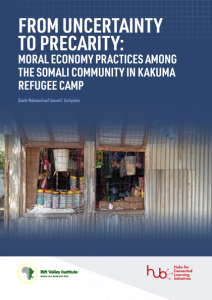This paper explores how precarity shapes life for Somali refugees in Kakuma refugee camp, north–western Kenya. Contrasting contemporary precarity with the uncertainty that previously shaped livelihoods and social structures in Somali pastoralist communities back home, the study asks not only how things have changed but also how past experiences might be shaping novel challenges. Precarity in Kakuma refugee camp stems from multiple factors, including a lack of employment opportunities and a dependence on humanitarian aid. Nevertheless, despite this precarity, Somalis in Kakuma still demonstrate a kind of resilience through practices that elsewhere have been described as essential to pastoralists who are navigating uncertainty. These include solidarity, the redistribution of resources and strong cultural norms. Meanwhile, economic volatility is navigated, both via support and remittances from an international diaspora and through networks that function through reciprocity and obligation. Exploring these issues, the paper highlights how Somali refugees deploy culturally rooted practices to manage the harsh environment of the camp, demonstrating a kind of resilience that emerges from reimagining and reconfiguring past orientations in order to negotiate new challenges and possibilities.
This paper has been published as a result of Bashir’s training in the Rift Valley Institute’s (RVI)
Research Communities of Practice (RCoP) project. The paper therefore reflects the views of the
author and not the position or the views of the Rift Valley Institute. The RCoP project is one of
several RVI flagship projects that support the professional development of early career researchers
in eastern and central Africa through training, mentorship and the dissemination of research
outputs. Building on the RVI’s long-term experience and presence in the region, RCoP is a valuesdriven
project built around a community of practitioners and academics with a common interest
in developing early career researchers in the region. With funding from, and in partnership with,
the Open Society University Network Hubs for Connected Learning Initiatives, the RVI trained
seven early career scholars from Kakuma refugee camp in the third phase of the project between
May and October 2024.




